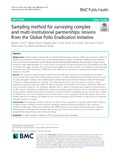Sampling method for surveying complex and multi-institutional partnerships: Lessons from the Global Polio Eradication Initiative

View/
Date
2020-08-12Publisher
BMCAuthor
Peters, Michael A.Deressa, Wakgari
Sarker, Malabika
Sharma, Neeraj
Owoaje, Eme
Ahmad, Riris Andono
Saljuqi, Tawab
Mafuta, Eric
Alonge, Olakunle
Metadata
Show full item recordCitation
Peters, M. A., Deressa, W., Sarker, M., Sharma, N., Owoaje, E., Ahmad, R. A., . . . Alonge, O. (2020). Sampling method for surveying complex and multi-institutional partnerships: Lessons from the global polio eradication initiative. BMC Public Health, 20 doi:10.1186/s12889-020-08592-xAbstract
Background: Complex global initiatives, like the Global Polio Eradication Initiative (GPEI), have prevented millions of
paralyses and improved the health status of diverse populations. Despite the logistical challenges these initiatives
must overcome at several levels, scant methods exist for systematically identifying and reaching a range of actors
involved in their implementation. As a result, efforts to document the lessons learned from such initiatives are often
incomplete. This paper describes the development and application of the Synthesis and Translation of Research and
Innovations from Polio Eradication (STRIPE) systematic approach for identifying a comprehensive sample of actors
involved in the GPEI.
Results: The survey for collecting lessons learned from the GPEI was conducted at the global level and within
seven countries that represented GPEI operational contexts. Standard organizational and operational levels, as well
as goals of program activities, were defined across contexts. Each survey iteration followed similar methodologies
to theorize a target population or “universe” of all polio-related actors in the study area, enumerate a source
population of specific individuals within the target population, and administer the survey to individuals within the
source population. Based on the systematic approach used to obtain a comprehensive sample for lessons learned
in GPEI, steps for obtaining a comprehensive sample for studying complex initiatives can be summarized as follows:
(i) State research goal(s); (ii) Describe the program of interest; (iii) Define a sampling universe to meet these criteria;
(iv) Estimate the size of the sampling universe; (v) Enumerate a source population within the universe that can be
feasibly reached for sampling; (vi) Sample from the source population; and (vii) Reflect on the process to determine
strength of inferences drawn.
Conclusions: The application of these methods can inform future evaluations of complex public health initiatives,
resulting in better adoption of lessons learned, ultimately improving efficacy and efficiency, and resulting in
significant health gains. Their use to administer the STRIPE lessons learned survey reflects experiences related to
implementation challenges and strategies used to overcome barriers from actors across an extensive range of
organizational, programming, and contextual settings.
